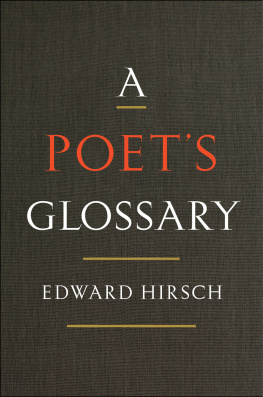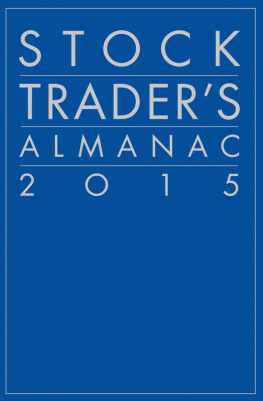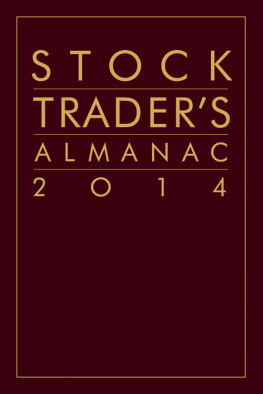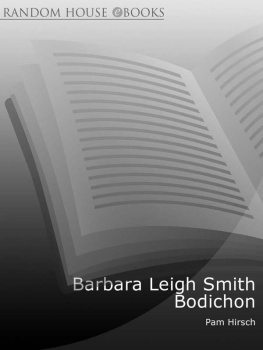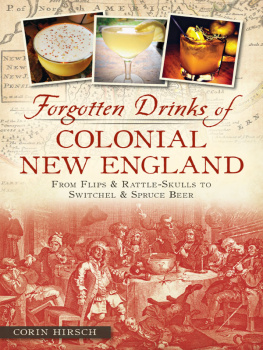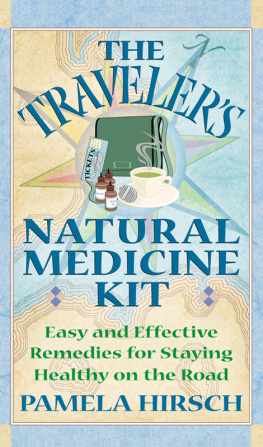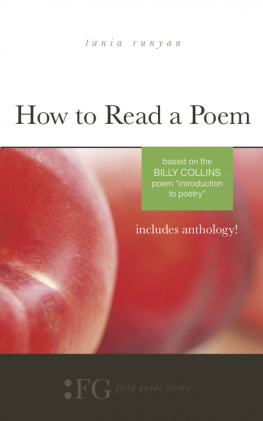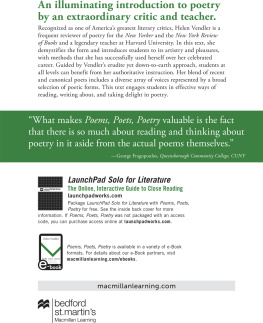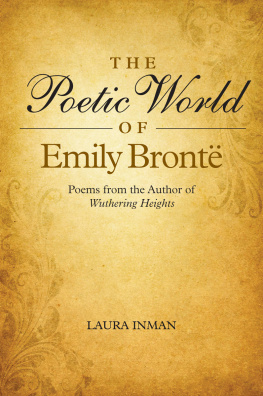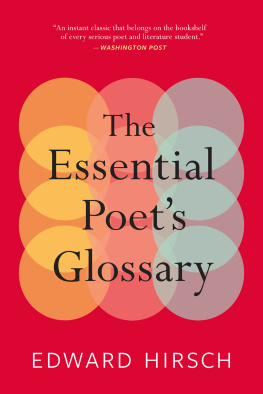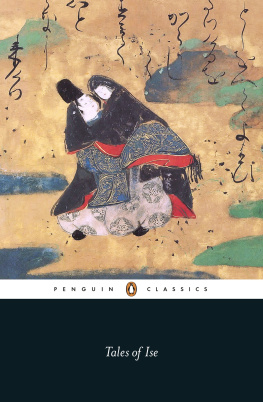Copyright 2014 by Edward Hirsch
All rights reserved
For information about permission to reproduce selections from this book, write to Permissions, Houghton Mifflin Harcourt Publishing Company, 215 Park Avenue South, New York, New York 10003.
www.hmhco.com
Library of Congress Cataloging-in-Publication Data is available.
ISBN 978-0-15-101195-7
e ISBN 978-0-547-73746-1
v1.0414
Credits appear on .
To Poetry
Dont desert me
just because I stayed up last night
watching The Lost Weekend.
I know Ive spent too much time
praising your naked body to strangers
and gossiping about lovers you betrayed.
Ive stalked you in foreign cities
and followed your far-flung movements,
pretending I could describe you.
Forgive me for getting jacked on coffee
and obsessing over your features
year after jittery year.
Im sorry for handing you a line
and typing you on a screen,
but dont let me suffer in silence.
Does anyone still invoke the Muse,
string a wooden lyre for Apollo,
or try to saddle up Pegasus?
Winged horse, heavenly god or goddess,
indifferent entity, secret code, stored magic,
pleasance and half wonder, hell,
I have loved you my entire life
without even knowing what you are
or howplease help meto find you.
Acknowledgments
My dear friend and colleague Andr Bernard first convinced me to write a glossary for How to Read a Poem and Fall in Love with Poetry. Everything here flows from that initial idea. He generously went over the manuscript of A Poets Glossary letter by letter, and it is a much clearer book because of his editorial hand, his decisive pencil, which I welcomed. I owe a special debt of thanks to my friend and editor Andrea Schultz, who gently but stubbornly coaxed this book out of me, and has seen it through with her characteristic good will and clear judgment. Special thanks, too, to her exemplary team at Houghton Mifflin Harcourt, especially Naomi Gibbs, who cleared the permissions, and Anne McPeak, who copyedited the manuscript. I am also eager to acknowledge my exemplary agent, Liz Darhansoff. I had three excellent short-term assistants who were lent to me by the MFA program at Hunter College, Sue Nacey, Sarah Eggars, and Micah Towery, all of whom worked on the book. I am grateful to the many poets, near and far, who have talked over so many of the topics of poetry with me over the years. Their impress is everywhere apparent. My deep gratitude goes out to Lauren Watel, my love, who read this book through entry by entry, letter by letter, with her characteristically keen intelligence and scrupulous eye. I know I havent always succeeded, but Ive tried to meet her high standards.
Preface
This bookone persons work, a poets glossaryhas grown, as if naturally, out of my lifelong interest in poetry, my curiosity about its vocabulary, its forms and genres, its histories and traditions, its classical, romantic, and modern movements, its various outlying groups, its small devices and large mysterieshow it works. I hope it will be pleasurable to read and useful to study. Its intended for both initiated and uninitiated readers, something to keep at hand, a compendium of discoveries that has befriended me. Its a book of familiar and unfamiliar terms, some archaic, others modern, some with long and complicated histories, others newly minted. The alphabetical format may feel cool, but the hand that made the art was warm, and this book is animated by the practitioners who made poetry their own: the rational and the irrational, the lettered and the unschooled, those who would storm the barricades and tear down the castle, those who would rebuild it, the high priests of art, the irreverent tricksters, the believers and the skeptics, the long-lived purists and the doomed romantics, the holy eccentrics, the critics, the craftsmen, and the seers (singers, chanters, listeners, readers, writers); my quarrelsome friends, an extended family of makers. Ive tried to figure out what theyve been up to over the centuries.
This book is as definitive, inclusive, and international as I could make itthe reader will find terms from a wide variety of poetries, oral and written, lyric and epic. Ive included examples whenever feasible. But its also selectiveIve inevitably followed my own interests and inclinations. This project has something of the madness of a Borgesian encyclopedia, since every culture has its own poetry, usually in its own language. It would be impossible to include all the terms in all the languages. Ive explained what I can. Im grounded in our moment, in the history of English and American literature, but Ive also looked for guidance to Hebrew and Arabic poetry, to Greek and Latin poetry, to the European poetries, east and west, to Irish, Welsh, and Scottish poetry, to Russian and Scandinavian poetry, to Chinese and Japanese poetry, to African, South Asian, and Latin American poetry. Ive left things out, sometimes inadvertently, Im sure. Ive relied on many different sourcesliterary, historical, folkloric, anthropological, linguistic, and philosophicaland built on the work of others, but the mistakes are my own. I take responsibility for whats here and whats not. This is the result of years of engagement.
Ive learned a tremendous amount in researching this book over the past fifteen years. As Ive worked, Ive often found myself transported to different time periods and countries, placing myself here and there, wondering what it would have been like to be a poet in the heady days of eighth-century China, or twelfth-century Provence, or thirteenth-century Florence, or fourteenth-century Andalusia, or fifteenth-century Wales, or seventeenth-century Japan, or early nineteenth-century England, or late nineteenth-century Ireland, or early twentieth-century Russia... I move freely among the bards, scops, and griots, the tribal singers, the poets of courtly love who sang for their mistresses, the court poets who wrote for their supper, the traveling minstrels, the revolutionaries, the flneurs, the witnesses. Ive encountered a series of recurring questions and debates about style and language, like the unresolved argument about the merits of the plain and the baroque style, or about the role of poetry in culture and society. There has been an ongoing quarrel, played out in many different countries, between tradition and innovation, the local and the international, the home-grown and the cosmopolitan. What language does one use, what forms does one employ? To whom is the poet responsible, and to what? Poetry, too, takes part in conversations about identity and nationalism. Ive been surprised in my research by the sheer number of poetic contests throughout history. We may think of poetry as a noncompetitive activity, or as a competition with oneself, a struggle between the poet and the poem, but poetry competitions have kept cropping up over the years. The aesthetic debates, seldom good-natured, have also been fierce. Ive tried to understand the intensities, to figure out whats at stake, and welcomed the contestants into the tent.
The devices work the magic in poetry, and a glossary gives names to those devices. It unpacks them. I believe its purpose is to deepen the readers initiation into the mysteries. Here, then, is a repertoire of poetic secrets, a vocabulary, some of it ancient, which proposes a greater pleasure in the text, deeper levels of enchantment.
A
abecedarian An alphabetical acrostic in which each line or stanza begins with a successive letter of the alphabet. The word derives from the names of the first four letters of the alphabet plus the suffix -arius (abecedarius). The abecedarian, which generally starts with the first letter of the alphabet and runs to the final letter, is an ancient form often employed for sacred works. Most of the acrostics in the Hebrew Bible are alphabetical, such as Psalm 119, which consists of twenty-two eight-line stanzas, one for each letter of the Hebrew alphabet. The first eight lines all begin with the letter
Next page
